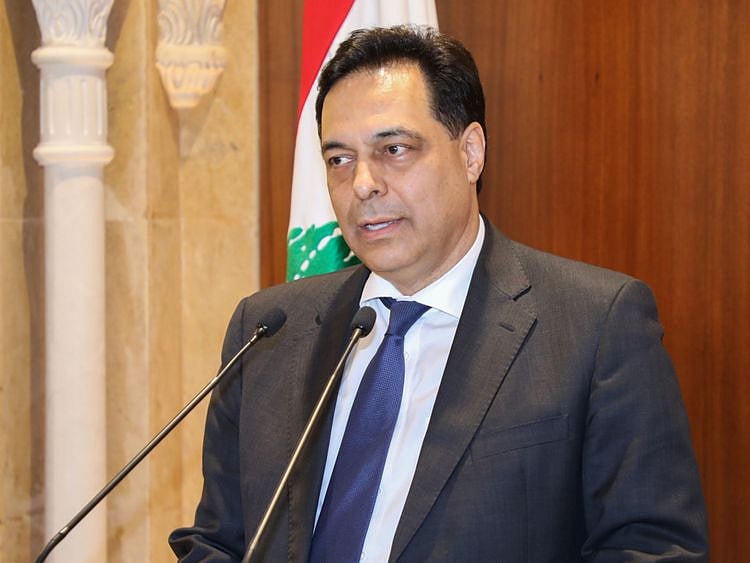Is Lebanon’s prime minister-designate Hassan Diab doomed to fail?
Hezbollah is marketing him as an independent who will form a technocrat government

Also In This Package
Damascus: Analysts are divided on what to make of Hassan Diab, the prime minister-designate of Lebanon, who was mandated to form a new government last week by President Michel Aoun.
Due to the strong support that he got from Hezbollah, Amal, and the Free Patriotic Movement, many have accused him of being a puppet in the hands of the March 8 Alliance.
Others say he is an independent non-partisan, describing him as a professional technocrat.
“We cannot expect a cabinet formed by Hassan Diab to succeed,” said Asaad Beshara, a prominent Lebanese journalist.
“He was chosen because of his earlier commitments to Hezbollah, Amal, and the Aounists. They gave him ceremonial room to maneuver, marketing him as an independent who will form a technocrat government.”
“His candidacy was packaged and parachuted,” added Rola Tabsh Jaroudi, a Lebanese MP and member of the Future Bloc.
“It is doomed to fail on the street.”
Diab is the fourth nominee for the job since last October.
The first, ex-economy minister Mohammad Al Safadi was rejected by the angry protestors, claiming that he was too close to the political establishment that they were trying to topple.
The second, ex-justice Minister Bahij Tabbara was disqualified because of his advanced age, while independent businessman Samir Al Khatib was forced to withdraw his nomination, after learning that then-caretaker premier Saad Hariri would not endorse him.
Lack of Sunni support
During the parliamentary consultations that took place last week, Diab got 69 out of 128 votes in the chamber of deputies.
He got all the 13 votes of Hezbollah, the 16 of Amal, and the 29 of the Free Patriotic Movement, in addition to a handful of independents.
The main Sunni bloc, led by outgoing premier Saad Hariri, refused to endorse him, however, raising speculation on how Diab will manage with no Sunni cover in the complex web of Lebanese politics.
Hassan Mereeb, the deputy inspector general of the powerful Dar Al Fatwa, added that Diab’s nomination was put forth by outgoing foreign minister Gebran Bassil, rather from Lebanese Sunnis.
Hariri’s supporters angrily took to the streets of Beirut on December 20, voicing their objection to Diab’s candidacy.
Hariri met with him but has not endorsed him.
A speedy collapse
“Diab’s candidacy will only prolong the crisis and hasten the collapse,” added Beshara, speaking to Gulf News.
Lebanon’s economy is in shambles due to three decades of corruption and misguided banking policies.
Since outbreak of the Lebanese revolution on October 17, 2019, the Lebanese lira has plummeted in value, from 1,500 to 2,000-2,100 to the US dollar.
Before resigning on October 29, Hariri had proposed a basket of economic reforms, which included slashing the salaries of top current and former government officials, raising taxes on banks, and abolishing several costly and unnecessary government institutions, like the Ministry of Information.
It is unclear whether Diab will adhere to any of the above, when and if he forms his government.
The Future Movement claims that only Hariri is capable of unlocking $11 billion USD in international aid, pledged to Lebanon by donors in France back in April 2018.
That assistance was repeatedly delayed, due to international donors insisting that it would only be given if the Lebanese government carried out a series of economic and political measures, which included the curbing of Hezbollah’s influence in Lebanon.
Hariri conditioned that he be tasked with forming a technocrat government, where ministers are appointed for their professional merit, rather than political affiliation.
Hezbollah and the Aounists have been peddling the idea of a “techno-political government” where sovereignty posts, like foreign affairs, defense, and interior, are kept in the hands of the main political parties, while service-related portfolios go to independent technocrats.
Diab, an independent technocrat?
“Hassan Diab has a high chance of success,” claimed Lebanese political analyst Nidal Al Sabe.
Speaking to Gulf News, he explained: “They have been asking for a technocrat to head the government and Diab fits that criteria.”
The 60-year old academic is a professor of computer engineering at the American University of Beirut (AUB), who since 2006, has served as its Vice-President for Regional External Programs. In 2011-2014, he served as minister of education under Prime Minister Najib Mikati, raising eyebrows for publishing a book—at government expense—documenting his achievements while in office.
“They are saying he is a member of Hezbollah. How would AUB possibly work with somebody who is affiliated with Hezbollah?” asked Sabe.
He expected the cabinet formation to last weeks, possibly an entire month.
“Will it solve the economic crisis? I don’t think so, unless he starts addressing serious reforms immediately, and gets enough domestic, regional, and international backing. But even then, it will take at least two years for the situation to improve.”
“Until now the debate has been on how Diab was chosen, but soon, we will eventually deal with more serious and deeper issues,” said Jamil Mouawad, an AUB professor.
Speaking to Gulf News, he asked: “Do we privatize, or not? Do we impose more taxes, or not? Where does Diab stand on all of this? Did he even have time to think about these questions? We have no idea.”
Sign up for the Daily Briefing
Get the latest news and updates straight to your inbox
Network Links
GN StoreDownload our app
© Al Nisr Publishing LLC 2025. All rights reserved.